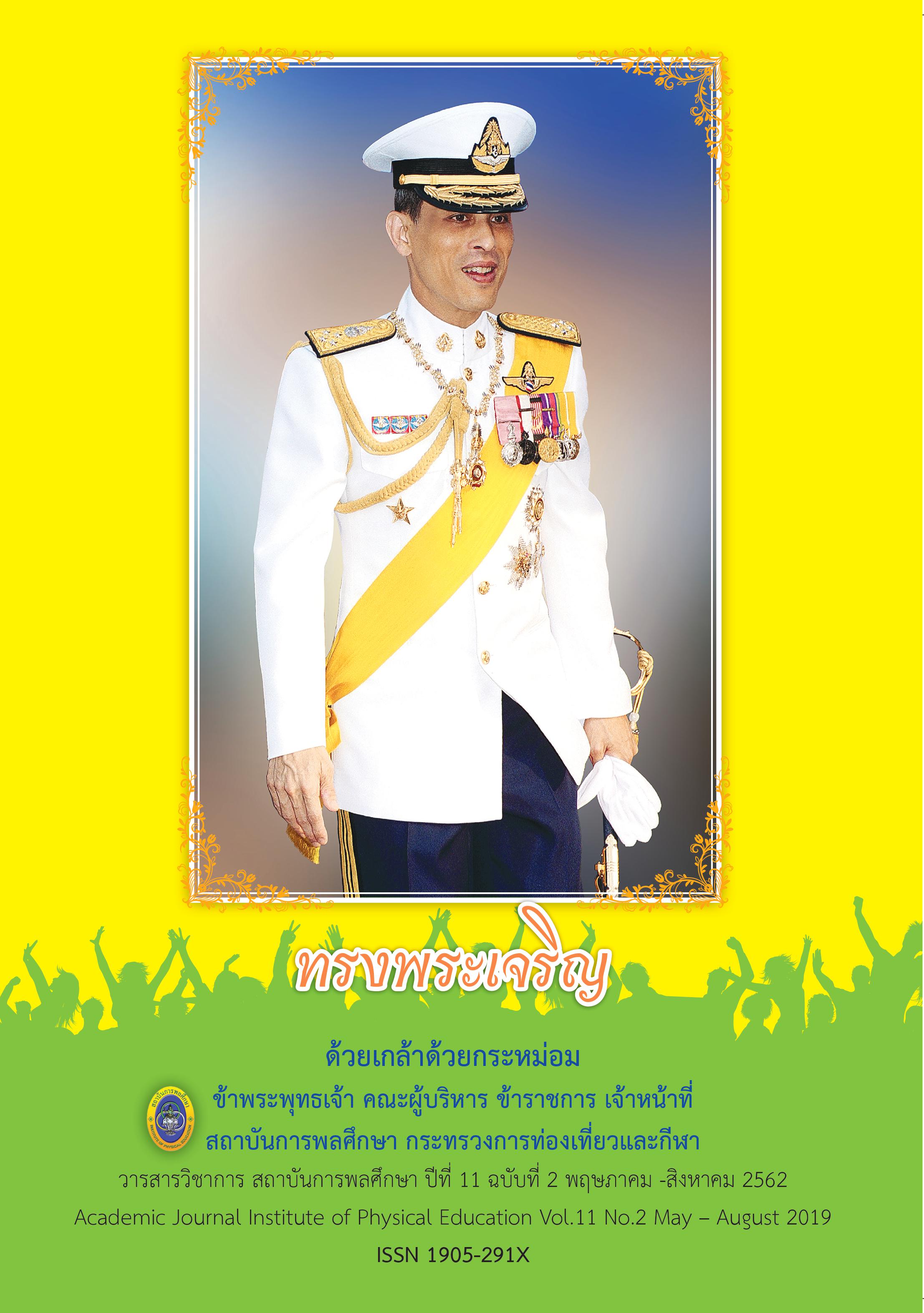THE ANTECEDENTS OF LEARNING OUTCOMES OF THE BACHELOR OF EDUCATION PROGRAM IN PHYSICAL EDUCATION, INSTITUTE OF PHYSICAL EDUCATION
Main Article Content
Abstract
This research has dual objectives to 1) current status of the antecedents of learning outcomes of the bachelor of education program in Physical Education, Institute of Physical Education., and 2) the influence of the antecedents of learning outcomes of the bachelor of education program in Physical Education, Institute of Physical Education. The researcher combined both qualitative and quantitative research methods to gather data from students, curriculum committee and Lecturers of Faculty of Physical Education; totally 497 people. Structural equation modeling, SEM was employed to analyze the conceptual framework, using LISREL software program to find the influence of antecedent factors on the antecedents of learning outcomes of the bachelor of education program in Physical Education. Qualitative data analysis was conducted, using ATLAS.ti software program, the results were then combined with quantitative results. The study revealed that current status of desired characteristics of the students’ in overall was found the profession of physical education teacher trained a person to be good, selfless and patient. For the appropriateness of the curriculum, the content was consistent with the field and relatedly continuous. For the institutional support, the institute provided a place with landscape and environment which was supportive to teaching and learning.
For educational management the faculty was able to manage a teaching plan throughout the curriculum with the monitoring system on academic tasks for the learning success of the students at a high level. For standard of students’ learning outcomes the students realized the importance and value of the physical education profession, they were knowledgeable in the principles of sports teaching, and had techniques and skills in the sports which could lead
to a systematic learning process at a high level. The learning outcomes of the bachelor of education program in Physical Education were influenced by 3 factors, in order of effect size; appropriateness of curriculum, education management, students’ appropriate characteristics. It was also found that appropriateness of curriculum was the factor supporting transmission of education management to the effectiveness of learning outcomes of the bachelor of
education program in Physical Education.
Article Details
The published article is a copyright of the Academic Journal of Thailand National Sports University. The passage appeared in each article in this academic journal is a perspective of each author which is not related to the journal. Each author is required to be responsible for all components of his/her own article. If there are any mistakes, each author must be responsible for those mistakes on his/her own.
References
Danielson, C. (2014). Framework for Teaching. Retrieved December 23, 2017, from http://education.ky.gov/teachers/pges/tpges/documents/Kentucky%20framework%20for%20teaching.pdf
Grodsky, R. (2015). Clubs and organizations handbook. Retrieved September 28, 2017, from http://www.mcgeorge.edu/Documents/Policies/CSOHandbook.pdf
Institute of Physical Education. (2013). Bachelor of education program in physical education. Bangkok: Ministry of Tourism and Sports. [in thai]
Karaaslan, O., Diken, I., & Mahoney, G. (2013). A randomized control their of responsive teaching with young Turkish children and their mothers. Topic in early childhood special education, 33, 18-27.
Korczak, P., Smart, J., Delgado, R., Strobel, T. M., & Bradford, C. (2014). Auditory steady-state responses. Journal of the American Academy of Audiology, 23(3), 146-170.
Matsunaga, M. (2010). How to factor-analyze your data right: Do’s, don’ts, and how-to’s. International Journal of Psychological Research, 3(1), 97-110.
Ministry of Education. (2009). Thai qualifications framework for higher education. Retrieved November 24, 2017, from http://www.mua.go.th/users/tqf-hed/news/FilesNews/FilesNews2/news2.pdf. [in thai]
Prachaya Vesarach. (2002). Principles of education administration. Bangkok: Office for Educational Reform. [in thai]
Suchat Prasitrattasin. (2013). Applications of statistical methods in research. Bangkok: Samlada. [in thai]
The Higher Education Commission. (2009). Thai qualifications framework for higher education. Retrieved November 6, 2017, from http://www.mua.go.th/users/tqf-hed/news/FilesNews/FilesNews3/New328072552.pdf. [in thai]


